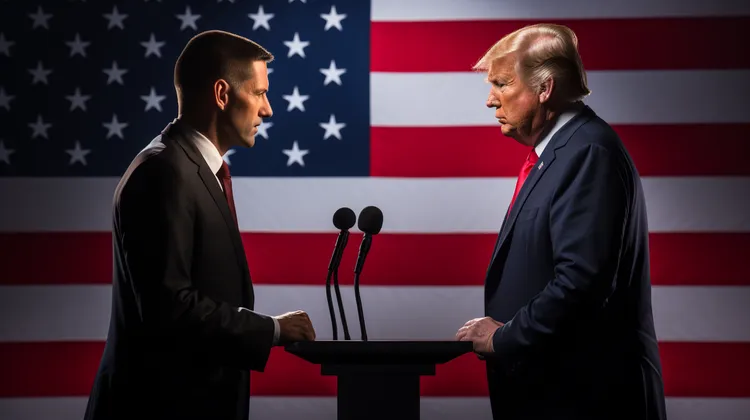
Candidates Discuss Crypto and Federal Regulation
The rapidly evolving landscape of cryptocurrency has become a hotbed of debate among U.S. presidential candidates as they gear up for the upcoming election. With digital currencies like Bitcoin, Ethereum, and countless others gaining popularity and raising regulatory questions, candidates are now openly discussing the role of crypto in the future financial system and targeting federal regulators for their approach towards this nascent industry.
The emergence of crypto as an election issue underscores its growing impact on the economy and modern society. Presidential hopefuls from various parties are increasingly making their stances known, with some advocating for a hands-off approach that fosters innovation and others calling for tighter controls to protect investors and the financial system.
One prevalent concern among candidates is the lack of clear regulations for cryptocurrencies. They argue that the current regulatory environment is a patchwork of state and federal guidelines that can stifle innovation and give rise to uncertainty. The lack of a unified regulatory framework is a talking point uniting candidates who believe federal agencies need to step up and offer clarity.
The call for regulatory clarity also comes with concerns over consumer protection. High-profile scams and the volatile nature of crypto markets have led some candidates to express the need for regulations that safeguard investors without smothering the potential of blockchain technology. These presidential hopefuls are pushing for a balance that ensures the United States remains at the forefront of the digital finance revolution.
Supporters of crypto within the presidential race often emphasize its potential to democratize finance by providing access to those underserved by traditional banking systems. This message resonates particularly with younger voters, a demographic that presidential candidates are keen to engage with. As such, they are targeting regulators like the Securities and Exchange Commission (SEC) and the Commodity Futures Trading Commission (CFTC) to encourage the development of policies that would support inclusion and financial diversity.
On the other side of the debate are candidates who are less enthusiastic about the current state of crypto. They target regulators for what they see as a laissez-faire attitude that could lead to financial instability. These candidates focus on the potential for cryptocurrencies to be used in illicit activities due to their decentralized nature. They call for regulators to implement stringent measures to prevent money laundering, funding of terrorism, and other illegal activities.
Some of the presidential contenders are also concerned about the environmental impact of cryptocurrency mining, which is an energy-intensive process. They contend that federal regulators should not only focus on the financial aspects of crypto but also consider the ecological footprint of digital currencies.
This dialogue between candidates highlights a fundamental dichotomy: While some view cryptocurrency as an unstoppable force that will inevitably reshape finance, others see it as a speculative bubble that poses significant risks to investors and the integrity of the financial system. The latter group of candidates expresses the urgency for federal regulators to catch up with technology to mitigate these risks.
Another critical area of debate is the United States’ competitiveness in the global arena of digital finance. Presidential candidates emphasizing the future of tech are keen on fostering an environment that allows the U.S. to lead in cryptocurrency innovation. They argue that over-regulation could push talent and business overseas, where countries may offer more favorable conditions for crypto-related ventures.
Within this rigorous debate, several candidates have proposed novel approaches to crypto regulation. Some suggest the creation of a new, specialized regulatory body devoted solely to digital assets, while others propose a specific legal status for cryptocurrencies that would differentiate them from traditional securities and commodities.
The race for the presidency is shining a spotlight on cryptocurrencies like never before, and the discourse surrounding them is becoming more intricate and sophisticated. With federal regulators like the SEC and CFTC under scrutiny, candidates on both sides of the issue are considering how a future administration might shape the course of cryptocurrency regulation.
It’s clear that as the U.S. approaches election day, cryptocurrency will continue to be a subject of vigorous debate among presidential candidates. Their discussions on the matter and subsequent policy proposals will not only impact the citizens who may use crypto but also the broader trajectory of how these digital assets are integrated into the global financial system. Whoever ends up in the White House will have to contend with a complex, multifaceted challenge: guiding a burgeoning industry full of promise and peril through the uncertain waters of the 21st-century economy.
9 thoughts on “Candidates Discuss Crypto and Federal Regulation”
Leave a Reply
You must be logged in to post a comment.
Are these regulators just making room for big banks to swoop in and take over crypto? So much for decentralization.
Debates on digital assets are crucial. They shape how we’ll interact with our money in the future. 🤳💵
I’m worried that all this talk is just a precursor to overregulation that will stifle innovation. We’ve seen this play out before.
So tired of politicians acting like they care about consumer protection when it’s all about control and power. Crypto needs to be free from their grasps!
A dialogue on how crypto can boost financial diversity is much needed. Let’s make it happen!
Having presidential candidates proactively discussing crypto is a sign of progress. About time!
It’s reassuring to see crypto being taken seriously at the highest levels of politics. We’re moving forward!
Potential versus peril in the crypto industry is the kind of meaty issue that deserves election limelight!
Approaching crypto with an aim to lead globally is exactly the mindset we need. Go, USA! 🥇💼